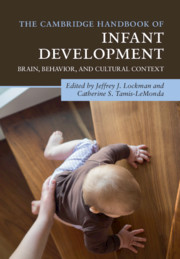Book contents
- The Cambridge Handbook of Infant Development
- The Cambridge Handbook of Infant Development
- Copyright page
- Dedication
- Contents
- Illustrations
- Contributors
- Preface
- Part I Foundations
- Part II Perceptual Development
- Part III Cognitive Development
- Part IV Action
- Part V Language
- Part VI Emotional and Social Development
- 25 Infant Attachment (to Mother and Father) and Its Place in Human Development
- 26 Infant Emotion Development and Temperament
- 27 Infant Emotional Development
- 28 Understanding and Evaluating the Moral World in Infancy
- 29 Cross-Cultural Perspectives on Parent–Infant Interactions
- Index
- References
28 - Understanding and Evaluating the Moral World in Infancy
from Part VI - Emotional and Social Development
Published online by Cambridge University Press: 26 September 2020
- The Cambridge Handbook of Infant Development
- The Cambridge Handbook of Infant Development
- Copyright page
- Dedication
- Contents
- Illustrations
- Contributors
- Preface
- Part I Foundations
- Part II Perceptual Development
- Part III Cognitive Development
- Part IV Action
- Part V Language
- Part VI Emotional and Social Development
- 25 Infant Attachment (to Mother and Father) and Its Place in Human Development
- 26 Infant Emotion Development and Temperament
- 27 Infant Emotional Development
- 28 Understanding and Evaluating the Moral World in Infancy
- 29 Cross-Cultural Perspectives on Parent–Infant Interactions
- Index
- References
Summary
A capacity for moral judgment, whereby certain actions and individuals are deemed good or bad and worthy of praise or punishment, is one of the defining characteristics of human social life. Although exactly which acts and individuals are considered worthy of moral consideration varies across cultures, it appears that all humans nevertheless share an overall tendency to see some things, commonly within the broad domains of harm and fairness, as morally right, good, permissible, or obligatory, and others as wrong, bad, impermissible, or forbidden (Brown, 1991). Perhaps most notably, humans do not merely evaluate the acts and individuals that directly influence themselves and their loved ones, but also readily evaluate those whose positive and negative acts solely influence unknown others. That is, the human moral sense does not appear to be characterized by concerns for what is right or wrong for me, but instead what is right or wrong in general.
Keywords
- Type
- Chapter
- Information
- The Cambridge Handbook of Infant DevelopmentBrain, Behavior, and Cultural Context, pp. 777 - 804Publisher: Cambridge University PressPrint publication year: 2020
References
- 3
- Cited by

